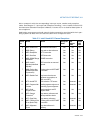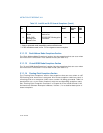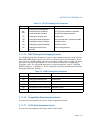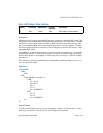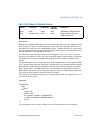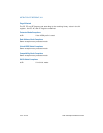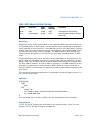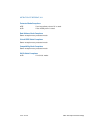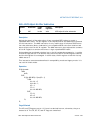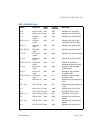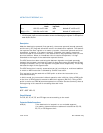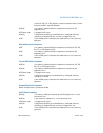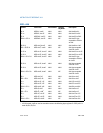
Vol. 2A 3-23
INSTRUCTION SET REFERENCE, A-M
AAM—ASCII Adjust AX After Multiply
AAM—ASCII Adjust AX After Multiply
Description
Adjusts the result of the multiplication of two unpacked BCD values to create a pair
of unpacked (base 10) BCD values. The AX register is the implied source and desti-
nation operand for this instruction. The AAM instruction is only useful when it follows
an MUL instruction that multiplies (binary multiplication) two unpacked BCD values
and stores a word result in the AX register. The AAM instruction then adjusts the
contents of the AX register to contain the correct 2-digit unpacked (base 10) BCD
result.
The generalized version of this instruction allows adjustment of the contents of the
AX to create two unpacked digits of any number base (see the “Operation” section
below). Here, the imm8 byte is set to the selected number base (for example, 08H
for octal, 0AH for decimal, or 0CH for base 12 numbers). The AAM mnemonic is inter-
preted by all assemblers to mean adjust to ASCII (base 10) values. To adjust to
values in another number base, the instruction must be hand coded in machine code
(D4 imm8).
This instruction executes as described in compatibility mode and legacy mode. It is
not valid in 64-bit mode.
Operation
IF 64-Bit Mode
THEN
#UD;
ELSE
tempAL ← AL;
AH ← tempAL / imm8; (* imm8 is set to 0AH for the AAM mnemonic *)
AL ← tempAL MOD imm8;
FI;
The immediate value (imm8) is taken from the second byte of the instruction.
Flags Affected
The SF, ZF, and PF flags are set according to the resulting binary value in the AL
register. The OF, AF, and CF flags are undefined.
Opcode Instruction 64-Bit
Mode
Compat/
Leg Mode
Description
D4 0A AAM Invalid Valid ASCII adjust AX after multiply.
D4 ib (No mnemonic) Invalid Valid Adjust AX after multiply to number
base imm8.



